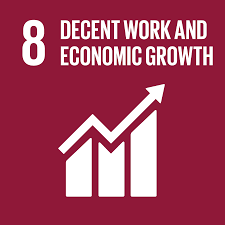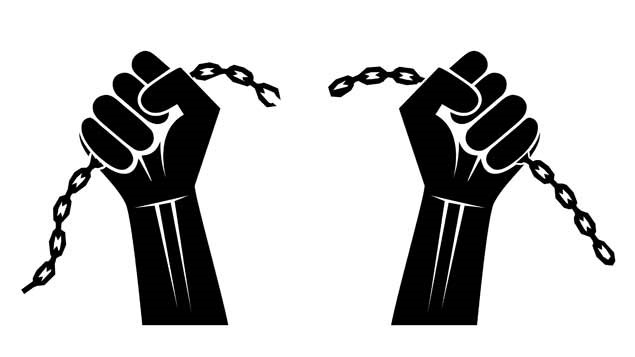This guest blog comes sixth in a series of blogs on the Sustainable Development Goals (SDGs) courtesy of Onna Malou van den Broek, second year doctorate student at King’s in the European & International Studies Department. Onna’s doctorate project titled: ‘The Political Payoff of Corporate Social Responsibility (CSR): CSR as a Determinant for Lobbying Success’, which looks at the relationship between corporate sustainability and lobbying, holding a special focus on the SDGs.
The SDGs as a framework are contested. The main criticism is that the goals are contradictory. In particular, SDG 8 has been accused of violating all other SDG objectives. Whereas the SDGs call to protect the planet, this goal aims for economic growth. A recent study showed that if global growth continues to rise with three percent per year, we will not be able to reduce CO2 emissions rapidly enough to keep temperature increases below 2 Celsius [1].
SDG 8: Decent Work and Economic Growth
The core idea behind this goal is that all must share in global progress. Decent employment opportunities create fair globalization and has the potential to reduce poverty. It can also provide legitimacy for our ‘social contract democracy’ and function as a pillar for peace and stability. In 2017, 5.6 per cent of the global population was unemployed. Moreover, to keep up with the growing number of people that fall within the ‘working age’, we need to create around 30 million additional jobs per year [2]. A job, however, does not always suffice; 783 million people that do have a job, still don’t earn enough to supply for their families.
The Targets: Growth, Employment and Working Conditions
This goal has three main elements: increase economic productivity, create jobs and improve working environments [3]. Economic growth trajectories vary per country. The least developed countries should increase their annual GDP by 7 percent through diversification, technological upgrading, innovation, tourism and access to banking. Increasing GDPs are expected to create more jobs, which should come with safe and secure working environments and provide equal pay for work of equal value. The most contested target is around ‘decoupling economic growth from environmental degradation’, in which green consumption should ensure that growth can happen within planetary boundaries.
Business Power and Sustainability
In his new book, professor Ponte [4] criticizes ‘green capitalism’ based on this decoupling. His arguments underline what many critics say: sustainable growth doesn’t tackle the main issues of production and consumption. Although the ecological impact per product might decrease, continuous expansion of production and consumption lead to a limited overall impact. In other
words, we cannot just buy our way out of the environmental crisis as consumption is at the heart of the problem. He suggests that to respect our planetary boundaries, we need to think about alternative ways of making the economy work, ranging from prosperity without growth to degrowth and eco-socialism.
Modern Slavery UK
Although contested, SDG 8 also touches upon important labour issues, such as modern slavery. Slavery is often associated with the past or far away countries. This is wrong because slavery is, unfortunately, thriving in the UK. In 2019, the English and Welsh police recorded 5,059 cases modern slavery. This is just a tip of the ice-berg; the real number of victims is approximately between 10,000 and 13,000 [5]. Someone is considered a slave if they are forced to work by threat, owned by an employer, treated as a commodity and limited in their freedom. Most people are trafficked into the UK from overseas and forced into jobs within the agriculture, construction, hospitality, manufacturing and car washes industries or sold as sex or domestic slaves. Unseen is an UK NGO fighting to eliminate slavery [6].
Gig Economy
Labour offences also happen is more subtle ways. Over time concerns have been mounting around the ‘gig economy’, which is characterized by a workforce that is based on short-term contracts or freelance work. Think for example about delivery couriers, Uber drivers and Task Rabbits. Many student jobs with zero-hour contracts also fall within this category. The main concern is around unfair pay and lack of workers protection and rights, such as sick pay, minimum income or insurance for work related accidents. An interesting recent counter movement are ‘worker-owned apps’ aiming to create network of cooperative alternatives of decent work [7].
What can you do?
· Purchasing Power: Over-consumption is a big part of our current ecological crisis. Think twice before you buy something new. If you do need to buy something, think about where
you buy your products. Try to buy from local and small companies and check how the product is made (supply chain).
· Political Power: Voting and political participation matters! Use your political power to demand governments to put necessary regulation in place. Public policies required to reach SDG 8 include mandatory corporate due diligence, stimulating the low carbon economy and applying minimum wages throughout the value chain [8].
· Witness Power: Keep your eyes open for cases of modern slavery and report to your local authorities if you see a suspicious situation. In the UK, you can do this by calling the modern slavery helpline at 08000 121 700.
References:
[1] Hickel, J. (2019). The contradiction of the sustainable development goals: Growth versus ecology on a finite planet. Sustainable Development.
[2] As always, read more on why the UN thinks this goal matters here: https://www.un.org/sustainabledevelopment/wp-content/uploads/2018/09/Goal-8.pdf
[3] More on the goal, targets, indicators and their progress can be found here: https://sustainabledevelopment.un.org/sdg8
[4] Especially the conclusion of professor Ponte’s new book on business power in sustainability through global value chains holds some strong arguments.
[5] Read the government’s report on modern slavery here: https://assets.publishing.service.gov.uk/government/uploads/system/uploads/attachment_data/file/840059/Modern_Slavery_Report_2019.pdf
[6] If you do one thing after reading this blog, then look at the TED talk of Kate Garbers, founder and director of Unseen, a NGO fighting modern slavery: https://www.unseenuk.org/modern-slavery/unseen-ted-talk
[7] This article of VICE tells more about how worker-owned apps provide a solution: https://www.vice.com/en_us/article/pa75a8/worker-owned-apps-are-trying-to-fix-the-gig-economys-exploitation?utm_campaign=sharebutton
[8] A few suggestions of the type of policies that we need can be found in this chapter: https://www.2030spotlight.org/en/book/1730/chapter/sdg-8-what-policies-are-needed-achieve-goal-8




